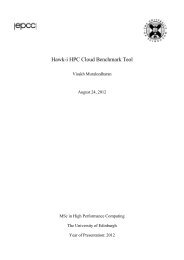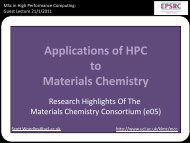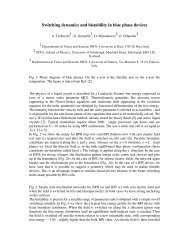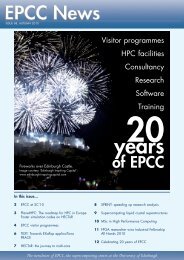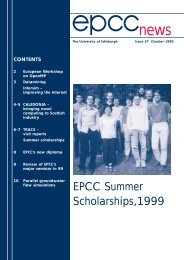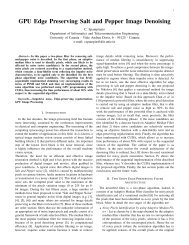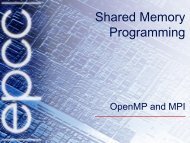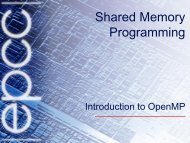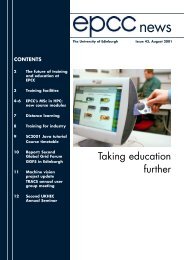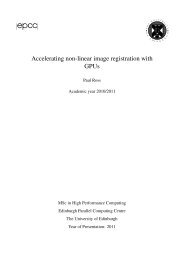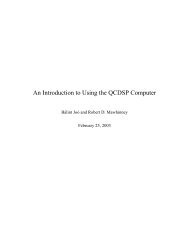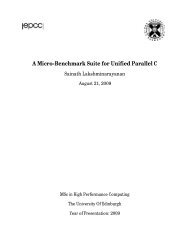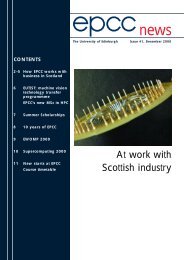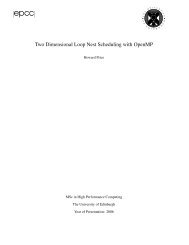Download PDF - EPCC - University of Edinburgh
Download PDF - EPCC - University of Edinburgh
Download PDF - EPCC - University of Edinburgh
Create successful ePaper yourself
Turn your PDF publications into a flip-book with our unique Google optimized e-Paper software.
FOCUS: HARDWAREOpening <strong>of</strong> the <strong>University</strong> <strong>of</strong> <strong>Edinburgh</strong>’sAdvanced Computing Facility Alison KennedyThe <strong>University</strong> <strong>of</strong> <strong>Edinburgh</strong>’s Advanced Computing Facility(ACF) was formally opened on 1st July 2005 by HisRoyal Highness, the Duke <strong>of</strong> <strong>Edinburgh</strong>, Chancellor <strong>of</strong> the<strong>University</strong> <strong>of</strong> <strong>Edinburgh</strong>. The facility hosts a range <strong>of</strong> highperformance computers with a combined performance <strong>of</strong>20 teraflops and a vast storage area network <strong>of</strong> 155 terabytes,all connected to national and international networks by a10 Gbit/s connection.Around 70 guests attended the opening, including <strong>University</strong>colleagues, senior IBM management (three <strong>of</strong> the computerswere installed in partnership with IBM), representatives <strong>of</strong>the Research Councils and <strong>of</strong> Scottish Enterprise.Dr Arthur Trew, Director <strong>of</strong> <strong>EPCC</strong>, welcomed the guests.He said: ‘Computer simulation has, over the past 25 years,become recognised as the third scientific methodology,complementing theory and experiment. The emergence <strong>of</strong>simulation as this vital scientific tool is due, in no small part,to the pioneering work <strong>of</strong> <strong>Edinburgh</strong> researchers. It has aunique ability to investigate complex scientific phenomenawhich are too fast, too slow, too large, too small, or simplytoo expensive for the traditional approaches.’The Chancellor’s party then went on a short tour <strong>of</strong> thecomputing facilities, while Dr Alan Simpson, <strong>EPCC</strong>’sTechnical Director, gave a talk entitled ‘<strong>EPCC</strong>: A Tradition <strong>of</strong>Excellence’ on the history <strong>of</strong> supercomputing at <strong>Edinburgh</strong>,to the remainder <strong>of</strong> the guests. This was followed by avideo highlighting some <strong>of</strong> the computational scienceprojects making use <strong>of</strong> the facilities at <strong>Edinburgh</strong>. When theChancellor’s party returned from the machine room tour,the Chancellor took the opportunity to speak to some <strong>of</strong> theresearchers and hear more about their work.The formal opening then took place. Firstly, the Principal,Pr<strong>of</strong>essor Tim O’Shea, spoke on the importance <strong>of</strong> the facilityto computational science at the <strong>University</strong>. He also paidtribute to the many colleagues who had played a part in thesetting up <strong>of</strong> the ACF. Next Pr<strong>of</strong>essor Richard Kenway, vice-Principal for HPC and eScience, and Nick Don<strong>of</strong>rio, IBM’sSenior Vice President <strong>of</strong> Technology and Manufacturing, spokeabout the mutually beneficial, close working relationshipbetween the <strong>University</strong> and IBM, which had helped to bringabout the impressive concentration <strong>of</strong> high performancecomputers at the ACF. The Chancellor then unveiled theplaque. This was followed by lunch, a poster session and byfurther machine rooms tours.The opening <strong>of</strong> the ACF underlines the <strong>University</strong> <strong>of</strong><strong>Edinburgh</strong>’s pioneering role in the use <strong>of</strong> computersimulation to tackle some <strong>of</strong> the world’s most complexscientific puzzles. The ACF will enable scientists to makeadvances in such crucial areas <strong>of</strong> research as drug discovery,climate prediction and the design <strong>of</strong> new materials. It willalso help researchers grapple with big scientific questions,such as gaining a better understanding <strong>of</strong> the structure <strong>of</strong>the Universe, or, at the other end <strong>of</strong> the scale, exploring themake-up <strong>of</strong> sub-atomic elementary particles.Since 1980, the <strong>University</strong> <strong>of</strong> <strong>Edinburgh</strong> has been preeminentin exploiting the largest available platforms inHigh Performance Computing (HPC) to push forwardtheir research in a wide range <strong>of</strong> disciplines. <strong>EPCC</strong>, one <strong>of</strong>the leading HPC centres in Europe, acts as the focus for itsinterests in this area. The opening <strong>of</strong> the ACF, supported byan IBM Shared <strong>University</strong> Research award, is the <strong>University</strong>’slatest strategic investment in HPC and its applications.The <strong>University</strong> Principal, Pr<strong>of</strong>essor Timothy O’Shea, said:‘The <strong>University</strong> <strong>of</strong> <strong>Edinburgh</strong> has a world-wide reputation inscience, and also in informatics. These strengths intersect inHigh Performance Computing and we have enjoyed a strongposition in this area through the leadership shown by ourphysicists in particular, by other elements <strong>of</strong> the scientificcommunity, and by <strong>EPCC</strong>. The Advanced Computing Facilityis evidence <strong>of</strong> our very strong and ongoing commitment tomaintain that leadership and to support the most advancedpossible scientific research.’Photos by Douglas Robertson Photography.3



